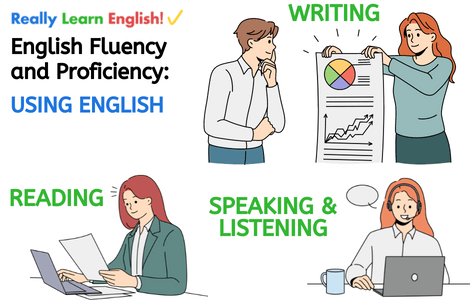What Is Your Level of English Fluency?
Do you need to assess your level of English
fluency? Perhaps you need to determine your level for work or
study purposes. Or maybe you want to know your level so that you can
set some goals for yourself.
It is actually quite simple to find out. We at Really Learn English can you help you assess your level of English fluency with our quick and easy online level test.
It is actually quite simple to find out. We at Really Learn English can you help you assess your level of English fluency with our quick and easy online level test.
Lesson Table of Contents
1) What Are English Levels of Fluency (Proficiency)?2) How to Assess your English Proficiency Level
3) Common Phrases to Describe Your Language Skills
4) How Can You Improve Your Level of English?
What Are English Levels of Fluency (Proficiency)?
Generally, when we talk about levels of English fluency or proficiency, we are referring to a person's ability to use the language for practical communication purposes.There are different level tests and frameworks that exist to help measure a person's level of English proficiency, but they all broadly follow the same level structure.
Fluency means being able to speak the language smoothly and easily. When you are fluent in a language, you can speak it without errors or pauses, effortlessly.
Proficiency means being able to use the language effectively for communication.

In simple terms, language proficiency is the ability to speak, read, and write in English. This can be demonstrated by being able to have a conversation in English, or by writing an essay in English. To be proficient in English, someone would need to be able to do these things at a high level.
Think of it like being a master chef who knows how to cook all kinds of food. They can take any ingredients and turn them into a delicious meal. Similarly, someone who is proficient in English can communicate clearly and effectively in any situation.
The main levels of English proficiency are:
- Beginner- Elementary
- Intermediate
- Upper-Intermediate
- Advanced
- Mastery
Beginner level speakers are those who have very limited ability to communicate in English. They may be able to introduce themselves and say a few basic things, but they would not be able to hold a conversation or understand much of what is said to them.
The average vocabulary size for a beginner English learner is a few hundred words. The average time to reach this level is around 70-150 hours.
Some examples of sentences that learners at the beginner level may be able to say:
- "I come from Spain."
- "I live in Paris."
- "My name is Bruno."
- "I'm fine, thank you."

Elementary level speakers have a basic ability to communicate in English on simple topics. They can understand and use simple phrases and sentences to describe their family and daily routine, for example.
The average vocabulary size for an elementary English learner is around 1000 words. This level generally takes around 150-200 hours to achieve (from the previous level).
Some examples of sentences that learners at the elementary level may be able to say:
- "I have two brothers and one sister."
- "I usually get up at 7 o'clock."
- "I work in a bank."
- "I like swimming."

Intermediate level speakers have a general ability to communicate in English on a range of topics. They can hold basic conversations, understand the main points in short talks, and read and write simple texts.
The average vocabulary size for an intermediate English learner is around 2000 words. This level generally takes between 300-400 hours to achieve (from the previous level).
Some examples of sentences that learners at the intermediate level may be able to say:
- "I prefer hot weather to cold weather."
- "I'd like to visit Australia one day."
- "Do you think learning English is important?"
- "The subway was very crowded this morning, so I had to wait for the next train."

Upper-intermediate level speakers have a good ability to communicate in English on a wide variety of topics. They can have fluent conversations, understand main points in long talks, and read or write texts with some level of complexity.
The average vocabulary size for an upper-intermediate English learner is around 3000 words. This level generally takes around 200-300 hours to achieve (from the previous level).
Some examples of sentences that learners at the upper-intermediate level may be able to say:
- "Where has the year gone? It feels like only yesterday it was January!"
- "By the time we finally arrived at the restaurant, we were both starving."
- "College definitively has its difficulties, but many great aspects come from it too. Such as meeting new people and discovering more about yourself."
- "My main long-term goal is to complete my accounting degree so that I can have a good job and a successful career. But I also want to travel to new places and see the world."

Advanced level speakers have a very good ability to communicate in English on almost any topic. They can communicate effectively and fluently, and understand the main points in long talks or complex texts. Idiomatic expressions and phrases are also used frequently at this level.
The average vocabulary size for an advanced English learner is around 5000 words. This level generally takes around 200-300 hours to achieve (from the previous level).
Some examples of sentences that learners at the advanced level may be able to say:
- "The data is clear. we need to take action now."
- "I'm afraid I don't have the time to go into that much detail."
- "The ball is in your court, so it's up to you to make the next move."
- "The law has been interpreted in different ways by the courts. Nevertheless, the general trend seems to be moving in favor of the plaintiff." ("Plaintiff" is a legal term meaning the person who submits a legal complaint.)

Mastery level speakers have a full mastery of the English language. They can communicate effortlessly on any topic and use a wide range of sophisticated vocabulary. They have reached a native-like level of fluency.
The average vocabulary size for a mastery level English learner is around 10,000 words. This level generally takes around 200-300 hours to achieve (from the previous level).
Some examples of sentences that learners at the mastery level may be able to say:
- "The current economic situation is not sustainable in the long term."
- "The company is exploring different options in order to increase profits. We may need to make some difficult decisions."
- "The government's proposal to raise the retirement age is coming under fire, with some people asserting that we need to take this step to protect our pension system and others arguing it would be unjust for those who have already contributed."
- "The patient's lab results show a low white blood cell count and anemia. This means that the patient is likely to have a weakened immune system and may be susceptible to infection. The anemia is also causing fatigue and weakness. Therefore, we recommend a course of treatment involving rest, a balanced diet, and iron supplements."

How to
Assess Your English Proficiency
Level
To find out your level of English, you can take
our online English proficiency test. Our test is free of
charge and only takes about 10 minutes to complete.
Common
Phrases to Describe Your Language
Skills
Here are some ways to describe your level of English proficiency:- "I can get by in English, but I'm not fluent." (Meaning: I don't always use proper English, but I can still communicate in the language.)
- "I'm pretty good at speaking English, but I need to work on my grammar." (Meaning: I can communicate well, but I need to improve my use of grammar rules.)
- "My English is a bit rusty because I haven't used it in a while." (Meaning: I used to be good at English, but I'm not as confident now because I haven't practiced it recently.)
- "I'm not confident speaking English, though I can understand it pretty well." (Meaning: I find it difficult to speak English, but I can usually understand other people when they're speaking.)
- "I can hold a conversation in English if I stick to simple topics." (Meaning: I can talk about basic things in English, but I find it difficult to have a conversation on more complicated topics.)
- "I have a pretty good level of English, but I'm not a native speaker." (Meaning: I'm not from an English-speaking country, but I have a good level of English.)
- "I speak English fluently." (Meaning: I can speak English confidently and without any problems.)

How Can
You Improve Your Level of
English?
Here are some of our resources you can use to improve your level of
English. They are suitable for learners of all age groups, and can
be used in class, with a tutor, or as a self-study
English program.
Free English Resources
English
Short StoriesEnglish Reading Practice
Reading Comprehension Texts and Exercises
Easy English Grammar
English Language Teaching Tips and Advice
Paid English eBooks
English
Short Stories, Book and Workbook, Emma and JerryStep-by-Step Rules, Stories and Exercises to Practice All Tenses
Best Deal: Full Package of All Store Products + Bonuses
See Also: The Really Learn English Level Chart
Paid English Online Courses
Really Learn English Online Courses - Full Access MembershipThis enables you to take any course you want, whenever you want. You'll have full access to all of our courses, so you can learn at your own pace and progress through the material as quickly or slowly as you like.
See Also: The Complete CEFR Levels in English Guide (Level A1, Level A2, Level B1, Level B2, Level C1, Level C2)
(CEFR stands for European Framework of Reference. This article includes helpful information on these English exams: IELTS, TOEFL, and Cambridge English Exams.)
Get Updates, Special Offers, and English Resources
Download your FREE GIFT (the first two chapters of
English Short Stories Book and Workbook)
as soon as you join!

By submitting your email, you consent to receiving updates and newsletters from us and to the sharing of your personal data with third parties for the purposes of sending you communications. We will not spam you. You can unsubscribe at any time. For more information, please see our privacy policy.
What
Is Your Level of English Fluency? to How to Speak English
Fluently





